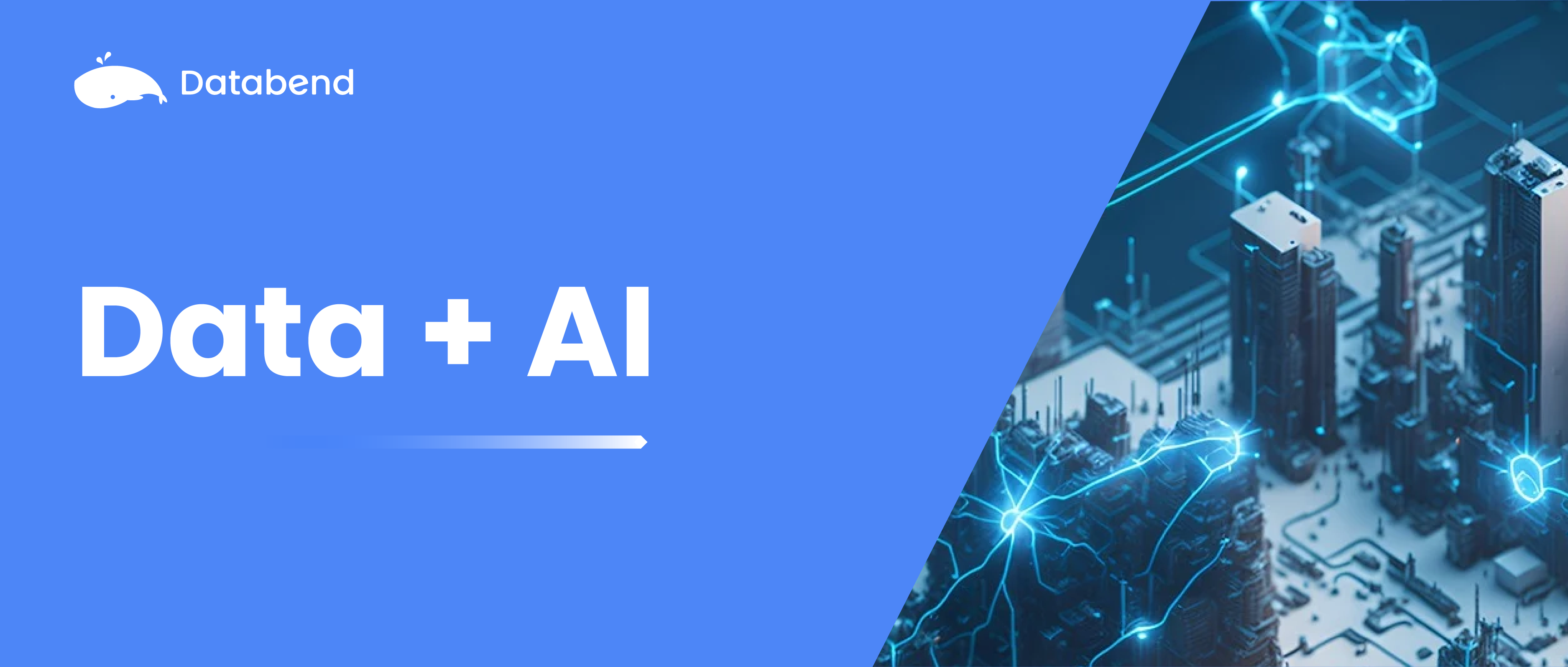How AI is Revolutionizing Data Analytics Today
Databend CloudNov 20, 2024

Artificial Intelligence (AI) is transforming the landscape of data analytics. By automating processes, AI enhances insights and improves predictive capabilities. This transformation allows businesses to analyze large datasets efficiently, identify patterns, and make informed decisions. A survey reveals that 54% of businesses using AI tools report positive results, with 14% experiencing improvements of 11% or more. Databend AI Functions exemplify these advancements by integrating machine learning into data analysis through intuitive SQL queries. This integration makes data+AI solutions more efficient, accurate, and scalable, unlocking the full potential of data analytics.
The Role of AI in Data+AI
Artificial Intelligence plays a pivotal role in transforming data analytics. By integrating AI technologies, you can unlock new potentials in data analysis, making it more efficient and insightful.
Integration of AI Technologies
AI technologies like machine learning algorithms and natural language processing are at the forefront of this transformation.
Machine Learning Algorithms
Machine learning algorithms enable you to analyze vast datasets quickly. These algorithms detect subtle patterns that traditional methods might miss. This capability allows for more precise insights, enhancing your decision-making process. According to a study, AI models can forecast future trends and behaviors with high accuracy, which is crucial for predictive analytics.
Natural Language Processing
Natural language processing (NLP) allows you to interact with data in a more intuitive way. With NLP, you can ask questions and receive dynamic responses without needing human intervention. This technology simplifies data analysis, making it accessible even to those without a technical background. AI analytics platforms leverage NLP to analyze large datasets, providing deeper insights into your data.
AI-Driven Data Analytics Tools
AI-driven tools automate many aspects of data analytics, streamlining processes and saving you time.
Automated Data Collection
AI tools automate data collection, drastically reducing the time required to gather information. These tools source data from various databases and integrated systems, simplifying data preparation. By automating this process, you can focus on analyzing the data rather than collecting it.
Real-Time Data Processing
Real-time data processing is another significant advantage of AI-driven tools. You can process data as it arrives, allowing for immediate insights and quicker decision-making. This capability is essential in today's fast-paced business environment, where timely information can give you a competitive edge.
Incorporating AI into your data analytics strategy can revolutionize how you handle data. By leveraging AI technologies and tools, you can enhance your data+AI capabilities, leading to more informed decisions and better outcomes.
Key Transformations in Data+AI
Artificial Intelligence (AI) has brought significant transformations to data analytics, making it more efficient and insightful. Let's explore how AI is reshaping the landscape of data analytics.
Automation of Data Processing
AI automates data processing, which streamlines data collection and reduces manual effort.
Streamlining Data Collection
You can now collect data automatically with AI tools. These tools gather information from various sources, saving you time and effort. Unlike traditional methods, which require manual data entry, AI simplifies the process. This automation allows you to focus on analyzing data rather than collecting it.
Reducing Manual Effort
AI reduces the need for manual intervention in data processing. By automating repetitive tasks, you can minimize human error and improve accuracy. This shift not only saves time but also enhances the quality of your data analysis.
Enhanced Data Insights
AI provides enhanced insights by utilizing advanced analytical models and identifying hidden patterns.
Advanced Analytical Models
AI employs sophisticated models to analyze data. These models can process vast amounts of information quickly, offering insights that traditional methods might miss. You gain a deeper understanding of your data, leading to more informed decisions.
Identifying Hidden Patterns
AI excels at detecting patterns within complex datasets. It identifies trends and relationships that are not immediately apparent. This capability allows you to uncover valuable insights, enhancing your strategic decision-making.
Predictive Analytics
AI enhances predictive analytics by improving forecasting accuracy and anticipating market trends.
Improved Forecasting Accuracy
AI improves the accuracy of forecasts by analyzing historical data and identifying patterns. You can make more precise predictions about future trends and behaviors. This accuracy is crucial for planning and decision-making.
Anticipating Market Trends
AI helps you anticipate market trends by analyzing real-time data. It detects emerging patterns, enabling you to stay ahead of the competition. This foresight allows you to adapt your strategies and capitalize on new opportunities.
By integrating AI into your data analytics strategy, you can transform how you process and analyze data. AI offers speed, accuracy, and insights that traditional methods cannot match. Embrace these transformations to enhance your data+AI capabilities and achieve better outcomes.
Benefits of AI in Data+AI
Artificial Intelligence (AI) offers numerous benefits in the realm of data analytics, enhancing efficiency, accuracy, and scalability. Let's delve into these advantages.
Increased Efficiency
AI significantly boosts efficiency in data analytics, allowing you to save both time and money.
Time Savings
AI tools automate repetitive tasks, enabling you to complete data processing much faster than traditional methods. By reducing the time spent on manual data entry and analysis, you can focus on strategic decision-making. This time-saving aspect is crucial in today's fast-paced business environment, where quick responses can lead to competitive advantages.
Cost Reduction
By automating processes, AI helps you cut costs associated with labor-intensive tasks. You can allocate resources more effectively, reducing the need for extensive manpower. A survey reveals that 79% of businesses adopting AI in marketing and sales have experienced increased revenue, highlighting the cost-effectiveness of AI solutions.
Improved Accuracy
AI enhances the accuracy of data analytics, minimizing errors and ensuring consistent data quality.
Minimizing Human Error
AI reduces the likelihood of human error by automating data processing tasks. You can rely on AI to handle complex calculations and analyses, ensuring precision in your results. This reduction in errors leads to more reliable insights and better decision-making.
Consistent Data Quality
AI ensures consistent data quality by standardizing data processing methods. You can maintain uniformity across datasets, which is essential for accurate analysis. This consistency allows you to trust the insights derived from your data, leading to more informed business strategies.
Scalability
AI provides scalability in data analytics, enabling you to handle large datasets and adapt to growing data needs.
Handling Large Datasets
AI excels at processing vast amounts of data quickly and efficiently. You can analyze large datasets without compromising on speed or accuracy. This capability is vital for businesses dealing with extensive data volumes, allowing you to extract valuable insights from complex datasets.
Adapting to Growing Data Needs
As your data needs grow, AI offers the flexibility to scale your analytics processes. You can easily integrate new data sources and expand your analysis capabilities. This adaptability ensures that your data analytics strategy remains robust and effective, even as your business evolves.
By leveraging AI in your data analytics strategy, you can achieve greater efficiency, accuracy, and scalability. These benefits empower you to make more informed decisions and drive better business outcomes.
Challenges and Considerations in Data+AI
As you integrate AI into data analytics, you must navigate several challenges and considerations. These include data privacy concerns and the skill gap in the workforce.
Data Privacy Concerns
Data privacy remains a significant concern when using AI in data analytics. You need to ensure that your data handling practices comply with regulations and protect user information.
Ensuring Data Security
To protect user data, you must implement robust security measures. This involves safeguarding data from unauthorized access and breaches. You should regularly update your security protocols to address emerging threats. By doing so, you can maintain the trust of your users and stakeholders.
"Data Privacy and Security in AI Systems" emphasizes the importance of robust data privacy policies. These policies help prevent unauthorized access and protect user data.
Compliance with Regulations
Compliance with data privacy regulations is crucial. Laws like the California Consumer Privacy Rights Act (CCPA) and the General Data Protection Regulation (GDPR) require you to inform users about data collection practices. You must also provide options for users to object to data sales. Operating across different regions adds complexity, as you must adhere to various regulations.
The AI Act introduces new rules to regulate AI systems, aiming to protect privacy and avoid bias. As more regulations emerge, you must stay informed and adapt your practices accordingly.
Skill Gap
The integration of AI in data analytics highlights a skill gap in the workforce. You need skilled professionals to effectively implement and manage AI technologies.
Need for Skilled Professionals
AI technologies require expertise in machine learning, data analysis, and programming. You must hire professionals with these skills to maximize the benefits of AI. A lack of skilled personnel can hinder your ability to leverage AI effectively.
Regulatory Compliance Guidelines for AI Technologies stress the need for organizations to follow data protection laws and algorithmic accountability measures. Skilled professionals are essential for navigating these requirements.
Training and Development
To bridge the skill gap, invest in training and development programs. These programs should focus on upskilling your existing workforce. By providing opportunities for learning, you can equip your team with the necessary skills to handle AI technologies.
The AI Act suggests that organizations must create frameworks and guidelines for AI usage. Training your team ensures they understand these frameworks and can apply them effectively.
Addressing these challenges and considerations is vital for successfully integrating AI into your data analytics strategy. By ensuring data privacy and bridging the skill gap, you can harness the full potential of AI and drive better outcomes for your organization.
Real-World Applications of Data+AI
Artificial Intelligence (AI) is transforming various industries by enhancing data analytics capabilities. Let's explore how AI is making a significant impact in different sectors.
Healthcare Industry
AI is revolutionizing healthcare by providing advanced tools for diagnostics and treatment planning.
Predictive Diagnostics
You can use AI to predict diseases before they fully develop. AI analyzes patient data to identify early signs of illnesses. This predictive capability allows for timely interventions, improving patient outcomes. Data Ideology highlights that AI's ability to learn from data and predict outcomes is crucial in unlocking the full potential of data analytics in healthcare.
Personalized Treatment Plans
AI helps create personalized treatment plans tailored to individual patients. By analyzing genetic information and medical history, AI suggests the most effective treatments. This personalized approach enhances patient care and increases the likelihood of successful outcomes.
Financial Services
In the financial sector, AI enhances security and decision-making processes.
Fraud Detection
AI detects fraudulent activities by analyzing transaction patterns. You can rely on AI to identify anomalies and flag suspicious transactions. This proactive approach helps prevent fraud and protects your financial assets.
Risk Management
AI improves risk management by assessing potential risks and predicting market trends. You can use AI to make informed decisions, minimizing financial losses. Kellton Tech Blog emphasizes the importance of ethical and responsible AI use in decision-making processes, ensuring fairness and accountability.
Retail Sector
AI transforms the retail industry by optimizing customer interactions and inventory management.
Customer Behavior Analysis
AI analyzes customer behavior to provide insights into purchasing patterns. You can use this information to tailor marketing strategies and improve customer satisfaction. Understanding customer preferences helps you offer personalized experiences, boosting sales and loyalty.
Inventory Optimization
AI optimizes inventory management by predicting demand and adjusting stock levels. You can reduce overstock and stockouts, ensuring efficient operations. This optimization leads to cost savings and improved customer service.
By integrating AI into these industries, you can enhance efficiency, accuracy, and decision-making. AI's transformative power unlocks new opportunities for innovation and growth, reshaping how businesses operate and compete.
AI is revolutionizing data analytics by making it more efficient, accurate, and scalable. You can harness AI to automate tasks, analyze large datasets, and uncover valuable insights. Despite challenges like data privacy and skill gaps, the benefits and real-world applications demonstrate AI's transformative impact. The future of data analytics will continue to be shaped by AI advancements, offering new opportunities for innovation and growth. Databend AI Functions illustrate the potential for integrating AI into data analysis, enhancing accessibility and effectiveness. Embrace AI to unlock the full potential of your data analytics strategy.
Subscribe to our newsletter
Stay informed on feature releases, product roadmap, support, and cloud offerings!



